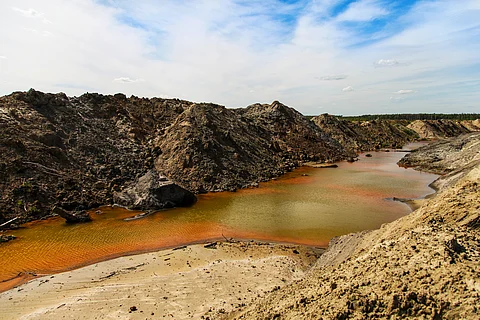

Zambian officials and environmental groups are confronting the devastating fallout of an acid leak at a Chinese-operated mine, which has polluted a vital river and could impact millions of people. Signs of contamination have been detected over 100 kilometres downstream, raising alarms about a potential large-scale environmental disaster.
The incident occurred on February 18 when a dam storing acidic waste from a copper mine in northern Zambia collapsed.
Investigators from the Engineering Institution of Zambia estimate that around 50 million litres of waste, containing strong acid, dissolved solids, and heavy metals, flowed into a tributary linked to the Kafue River, Zambia’s most important waterway.
“This is an environmental tragedy with severe implications,” said Chilekwa Mumba, an environmental activist based in Zambia’s Copperbelt Province.
China holds a dominant position in Zambia’s copper mining sector, with the country being one of the world’s top 10 copper producers. Copper is essential for modern technology.
Zambian President Hakainde Hichilema has appealed for expert assistance, describing the spill as a crisis that endangers both people and wildlife along the Kafue River, which runs over 1,500 kilometres through the nation. Investigations into the full extent of the damage are still in progress.
An Associated Press (AP) journalist visiting parts of the Kafue River observed dead fish along the banks nearly 100 kilometres from the mine operated by Sino-Metals Leach Zambia, a company largely owned by China Nonferrous Metals Industry Group.
The Ministry of Water Development and Sanitation reported “severe damage,” including the destruction of crops along the river.
Concerns are mounting that groundwater may also be contaminated as the toxic waste seeps into the soil and spreads to nearby areas. Local residents have reported drastic changes to the river’s ecosystem.
“Before 18 February, this river was full of life,” Sean Cornelius, a resident living near the Kafue told AP. “Now, it’s completely dead. It’s unbelievable. The river died overnight.”
The Kafue River basin supports about 60 per cent of Zambia’s population of 20 million, providing water for fishing, agriculture, and industry. It also supplies drinking water to approximately five million people, including residents of the capital, Lusaka. The acid spill has led to the suspension of water supplies in Kitwe, a city with around 700,000 inhabitants.
In response, the Zambian government has deployed the air force to drop hundreds of tonnes of lime into the river to neutralise the acid and limit further damage. Speedboats are also being used to distribute lime across affected areas. Government spokesperson Cornelius Mweetwa emphasised the seriousness of the situation and confirmed that Sino-Metals Leach Zambia would cover the costs of the cleanup.
Zhang Peiwen, chairman of Sino-Metals Leach Zambia, met with government officials this week and issued an apology. “This incident has been a wake-up call for our company and the mining industry,” he said. “We are fully committed to restoring the affected environment as quickly as possible.”
China’s extensive mining operations in Zambia and neighbouring countries such as Congo and Zimbabwe have frequently faced criticism for environmental and labour violations, despite their economic contributions. Chinese-owned copper mines in Zambia have been accused of neglecting safety and environmental regulations in their pursuit of resources, leading to growing frustration among local communities.
Zambia is struggling with over $4 billion in debt to China and had to restructure some of its loans after defaulting on repayments in 2020.
Shortly after the Sino-Metals incident, authorities discovered another acid leak at a smaller Chinese-owned mine in Zambia’s Copperbelt Province. Officials accused the mine of attempting to conceal the spill. A tragic accident also occurred at the site, where a worker fell into acid and died. Authorities allege that the mine continued operations despite being ordered to close. Two Chinese managers have been arrested.
Both mines have now been forced to cease operations following government orders. The situation has provoked widespread outrage among Zambians.
“This highlights the negligence of some investors when it comes to protecting the environment,” said Mweene Himwinga, an environmental engineer who attended a government meeting with Zhang and other officials. “They appear to have no concern for the consequences. It’s deeply concerning because this is our home—the only land we have.”